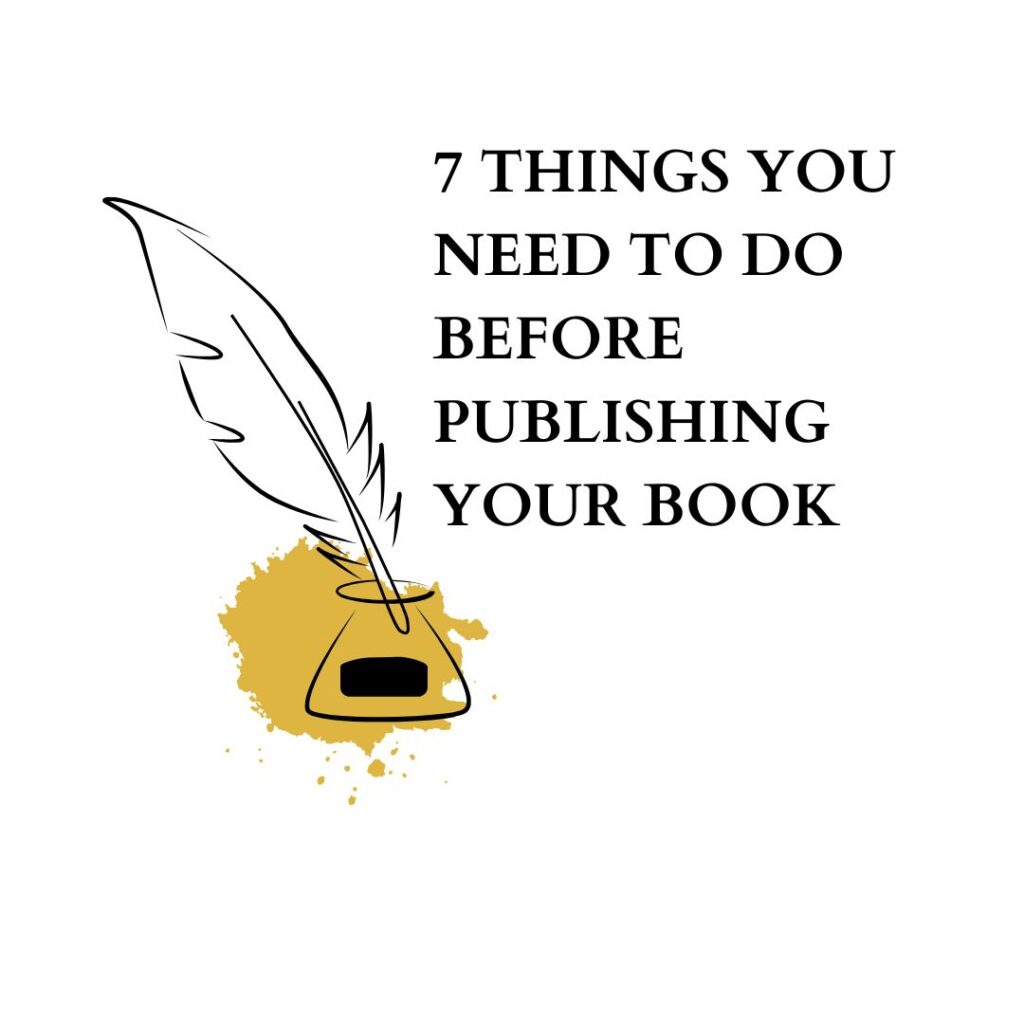7 Things You Need to Do Before Publishing Your Book
Publishing a book is an exciting milestone, but it requires careful preparation to ensure that your work resonates with readers and stands out in a competitive market. This comprehensive guide outlines the seven essential steps you should take before publishing your book, helping you to refine your manuscript and maximize its potential for success.

Table of Contents
Edit Your Manuscript Thoroughly
Editing is arguably the most crucial step in preparing your book for publication. A well-edited manuscript not only improves readability but also enhances the overall quality of your writing.
Types of Editing
- Developmental Editing: Focuses on structure, content, and flow. It involves assessing the overall narrative and ensuring that ideas are presented logically.
- Copyediting: Addresses grammar, punctuation, style, and consistency issues. This stage ensures that your writing is polished and professional.
- Proofreading: The final check for typos and formatting errors before publication.
Tips for Effective Editing
- Take a break after finishing your manuscript before starting the editing process to gain fresh perspective.
- Consider hiring a professional editor to provide an objective review.
- Use editing software tools like Grammarly or ProWritingAid to catch common mistakes.
Gather Feedback from Beta Readers
Beta readers are individuals who read your manuscript before it is published to provide feedback on its strengths and weaknesses.
Why Beta Readers Matter
- They offer insights into how your target audience will perceive your book.
- They can identify areas that may need clarification or improvement.
- Their feedback can help you make necessary adjustments before publication.
How to Find Beta Readers
- Reach out to friends, family, or writing groups who are familiar with your genre.
- Consider using social media platforms or writing forums to find interested readers.
- Provide clear guidelines on what kind of feedback you are looking for.
Create a Professional Book Cover
Your book cover is often the first impression potential readers will have of your work. A professional design can significantly impact sales and readership.
Elements of a Great Book Cover
- Visual Appeal: The cover should be eye-catching and relevant to the book’s content.
- Typography: Choose fonts that are easy to read and reflect the genre.
- Imagery: Use high-quality images or illustrations that convey the theme or mood of the book.
Hiring a Designer
Consider hiring a professional graphic designer who specializes in book covers. Provide them with details about your book’s genre, themes, and target audience to create an effective design.
Format Your Book for Print and Digital Versions
Proper formatting is essential for both print and digital editions of your book. Each format has specific guidelines that must be followed.
Formatting for Print
- Use appropriate margins, line spacing, and font sizes as per publishing standards.
- Include front matter (title page, copyright page) and back matter (about the author, acknowledgments).
Formatting for eBooks
- Ensure compatibility with various eReaders (e.g., Kindle, Nook).
- Use formats like EPUB or MOBI, which allow for flexible text resizing.
Tools for Formatting
Consider using formatting software like Scrivener or Vellum (for Mac users) to simplify the process.
Develop a Marketing Plan
A solid marketing plan is vital for promoting your book effectively once it’s published.
Key Components of a Marketing Plan
- Target Audience: Identify who will be most interested in your book.
- Promotion Strategies: Outline how you will promote your book (e.g., social media campaigns, email newsletters).
- Launch Events: Plan virtual or in-person events to generate buzz around your release.
Building an Author Platform
Start building an online presence through social media, a personal website, or a blog where you can connect with readers and share updates about your writing journey.
Optimize Your Online Presence
In today’s digital age, having a strong online presence is crucial for authors.
Steps to Optimize Your Online Presence
- Author Website: Create a professional website that showcases your bio, books, blog posts, and contact information.
- Social Media Profiles: Maintain active profiles on platforms where your target audience engages (e.g., Instagram, Twitter).
SEO Best Practices
Implement search engine optimization (SEO) strategies on your website by using relevant keywords related to your genre and content to improve visibility in search results.
Set Up Distribution Channels
Deciding how you will distribute your book is essential for reaching readers effectively.
Options for Distribution
- Traditional Publishing: If you choose this route, research publishers that align with your genre and prepare submission packages.
- Self-Publishing Platforms: Consider platforms like Amazon Kindle Direct Publishing (KDP), IngramSpark, or Smashwords for self-publishing options.
Pricing Strategy
Research similar books in your genre to determine competitive pricing. Consider offering promotional pricing during launch week to attract initial readers.
Frequently Asked Questions (FAQs)
Why is editing my manuscript so important?
Editing is crucial because it improves the clarity, coherence, and overall quality of your writing. A well-edited manuscript helps eliminate errors, enhances readability, and ensures that your ideas are communicated effectively to readers.
How can I find beta readers for my manuscript?
You can find beta readers by:
- Reaching out to friends, family, or writing groups familiar with your genre.
- Using social media platforms or writing forums to connect with interested readers.
- Offering clear guidelines on the type of feedback you seek.
What should I consider when designing my book cover?
When designing your book cover, consider:
- Visual appeal: Ensure it is eye-catching and relevant to the content.
- Typography: Use fonts that are easy to read and genre-appropriate.
- Imagery: Incorporate high-quality images or illustrations that reflect the theme of your book.
What are the differences between formatting for print and digital versions?
Formatting for print involves setting appropriate margins, and line spacing, and including front and back matter. Formatting for digital versions requires compatibility with eReaders and may involve using formats like EPUB or MOBI to allow for flexible text resizing.
How important is a marketing plan for my book?
A marketing plan is vital for promoting your book effectively. It helps you identify your target audience, outline promotion strategies, and plan launch events, ultimately increasing visibility and sales.
How can I optimize my online presence as an author?
To optimize your online presence:
- Create a professional author website showcasing your bio, books, and blog posts.
- Maintain active social media profiles where you engage with readers.
- Implement SEO strategies on your website using relevant keywords to improve search visibility.
What distribution options do I have for my book?
You can choose from several distribution options:
- Traditional Publishing: Submit your manuscript to publishers that align with your genre.
- Self-Publishing Platforms: Use platforms like Amazon Kindle Direct Publishing (KDP), IngramSpark, or Smashwords for self-publishing.
How should I price my book?
Research similar books in your genre to determine competitive pricing. Consider offering promotional pricing during the launch week to attract initial readers and generate buzz.
What common mistakes should I avoid when preparing to publish?
Common mistakes to avoid include:
- Skipping the editing process or not seeking feedback from others.
- Neglecting to create a professional cover design.
- Failing to develop a marketing plan or establish an online presence before launch.
Conclusion
Publishing a book is an exciting yet challenging endeavor that requires thorough preparation. By following these seven essential steps—editing your manuscript thoroughly, gathering feedback from beta readers, creating a professional cover, formatting appropriately, developing a marketing plan, optimizing your online presence, and setting up distribution channels—you can significantly enhance the likelihood of success for your book. Take the time to invest in these critical areas before publishing; doing so will not only improve the quality of your work but also increase its visibility and appeal in today’s competitive literary market!
Discover marketing services, interviews & publishing tools at SharingStories.




